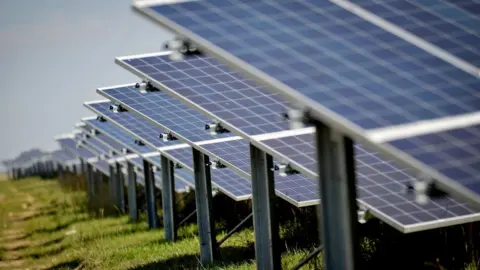Energy strategy delayed amid Treasury concerns over costs
 PA Media
PA MediaThe government's new energy supply strategy has been delayed, after reports the Treasury resisted some of the costs involved.
Boris Johnson promised the plan in "days" on 9 March to help tackle energy prices and reduce reliance on Russia.
But the date has been pushed back, with a Downing Street spokesman saying the energy strategy would not be released this week as expected.
The plan will outline a range of ways to produce more energy in the UK.
It is thought to include strategies for nuclear energy and renewable energy, plans to make homes more energy efficient and a route to increasing North Sea oil and gas production.
But a source told the BBC that the Treasury had raised concerns about the long-term cost implications of a target Mr Johnson had outlined - producing 25% of the UK's energy through nuclear by 2050 - as nuclear power plants are extremely expensive to build.
And sources close to the work said it was the primary area holding the strategy up.
Asked during a committee hearing on Monday if he was blocking the strategy, Chancellor Rishi Sunak denied it, saying: "I am certainly not blocking anything, the prime minister continues to work through the details of that.
"Given how important it is, I think it is important we get it right... and it is being worked out at pace between all the relevant ministers."
The BBC understands there are split opinions over other elements of the strategy, as well as nuclear.
Some ministers and Tory MPs had pushed for the government to re-examine fracking, but it is not expected to play a significant role.
The government's moratorium on fracking will remain in place unless they believe the science has changed and it is deemed safe.
Cabinet ministers are also split on whether planning laws in England should be reviewed to make it easier to approve new onshore wind farms.
Business Secretary Kwasi Kwarteng and Levelling Up Minister Michael Gove are in favour, but some other cabinet ministers remain opposed.
Because some of the targets set out in the strategy will be years - even decades - away, the cost of them would fall outside the current Spending Review period.
It's understood that commitment to longer-term funding at future spending reviews is one of the complications that has led to delay.
Onshore and offshore wind
It is also understood the strategy will outline community benefits and incentives for renewable energy sources, including onshore wind.
An idea being considered by ministers is making energy bills cheaper depending how close people live to an onshore wind farm.
The PM's official spokesman confirmed the further delay to the strategy on Monday, but said it was "a significant piece of work", adding: "It is right we take the right amount of time to do it.
"We will set out plans for publication as soon as possible."
Meanwhile, the UK is facing a legal challenge from the EU for what it claimed to be "discriminatory" practices in the offshore wind sector.
In what is thought to be the first post-Brexit case between the two sides at the World Trade Organisation, the bloc said the criteria used by the UK government in awarding subsidies for offshore wind energy projects "favour UK over imported content".
A statement added: "The EU has raised its concerns with the UK on several occasions, but to no avail.
"The EU is, therefore, bringing the matter to the WTO and hopes that it can be resolved swiftly."
But a Whitehall source criticised the move, saying the supply chain policy in operation was similar to many schemes in the EU.
They added: "At a time when the West should be united in defeating Putin, this act of envy by Brussels is ill-judged and ill-timed.
"We should be working together to strengthen European clean energy security, not fighting this out in court."
The source added that Business Secretary Kwasi Kwarteng had asked officials to "rigorously contest the EU's challenge".